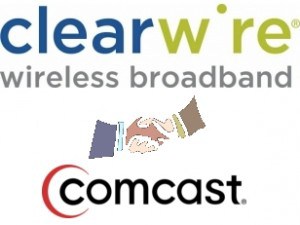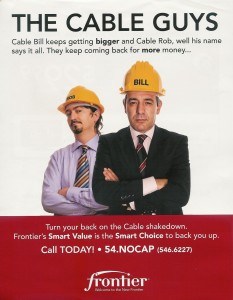 Cable operators have been looking for a way to expand their broadband service to outside the home, and Comcast, Bright House, and Time Warner Cable have found their answer: WiMax technology from Clearwire. They’ve joined Intel and Google as minority investors, collectively owning 25% of Clearwire, after investing more than $3 billion dollars in the wireless broadband service. What do they get for the buy-in? The chance to market Clearwire services to their cable broadband customers for “on-the-go” broadband.
Cable operators have been looking for a way to expand their broadband service to outside the home, and Comcast, Bright House, and Time Warner Cable have found their answer: WiMax technology from Clearwire. They’ve joined Intel and Google as minority investors, collectively owning 25% of Clearwire, after investing more than $3 billion dollars in the wireless broadband service. What do they get for the buy-in? The chance to market Clearwire services to their cable broadband customers for “on-the-go” broadband.
Comcast High-Speed 2go Metro service launched Tuesday in Portland, Oregon providing consumers with portable speed up to 4Mbps in Clearwire’s own 4G network service area. Comcast customers can sign up for a promotion for $49.95 a month for one year, which includes their wired cable modem service, a Wi-Fi router, and Clearwire wireless service (regular price after the promotion is $72.95 monthly). Customers can access the service in any Clearwire 4G service area nationwide. Where Clearwire doesn’t offer service, customers can “roam” on Sprint’s 3G data network nationwide for an additional $20 a month more. There are no known usage limits at this time. Existing Comcast broadband customers in Portland can add the Clearwire-based service starting at $30 a month.
The service will work for laptops, but not mobile data devices. Comcast’s investment in Clearwire made such a venture possible, and is expected to compete with mobile phone broadband data plans, which typically offer 5GB of service for $50 a month.
Comcast will sell service in Atlanta, Chicago and Philadelphia by the end of 2009.
While the service will be useful for Comcast customers who travel or who want more reliable, fast wireless data access, Clearwire’s ability to serve as a true competitor to Comcast, Time Warner Cable, and Bright House may be compromised by those partnerships.
Could Clearwire effectively create promotions and plans that could lead to customers cutting the cord on their cable broadband provider? Should cable companies increase their investments and ownership interest in Clearwire, would it ultimately matter to them where you obtained service?


 Subscribe
Subscribe

